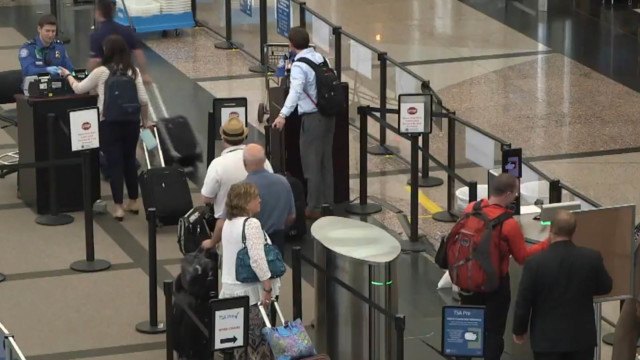Nearly 16 years after the 9/11 terrorist attacks, airline passengers in the U.S. have adapted to a stricter security routine. In fact, for many, it’s become quite routine.
But the U.S. Transportation Security Administration believes there’s room for improvement in these airport terminals. For the next several weeks, here at Denver International Airport and at Atlanta, Georgia’s international airport, it’s testing new fingerprint technology as a way of screening passengers.
CGTN’s Hendrik Sybrandy reports from Denver.
These scanners match fingerprints with those provided by passengers when they enrolled in the TSA pre-program, which provides travelers departing from U.S. airports with expedited security screening benefits.
It’s a form of biometrics, the use of physical characteristics to identify people through automation. The same principle that allows me to unlock my smartphone with my very unique right thumb.
“Through these and other technology demonstrations,” a T.S.A. official said. “We are looking to reinvent and enhance security effectiveness to meet the evolving threat and ensure that passengers get to their destinations safely.”
Cybersecurity expert Steve Beaty said biometrics eliminate the human error in the identification process but that this approach is only as good as the technology used.
“If somebody puts up a thumb and it registers that they’re that person and they’re not, that’s a false positive. If they are that person and it says they are not, that’s a false negative,” Beaty said, “Those are the kinks if you will that have to be worked out.”
Airport security expert Jeff Price applauded the new test, which is voluntary for passengers, but he thinks security checkpoints should be more of a priority.
“I think it’s a good idea but it’s really only strengthening one of the lesser layers of security,” Price said. “I’d much rather see more deployment of more effective screening technology so we’re not having to take laptops out and unpack our bags…Because that’s truly a critical layer in our system.”
Some people worry that these fingerprint scanners will take away some of their privacy, saying it sounds a little like “Big Brother,” and, that stolen information can be used elsewhere.
All things to be considered, along with the effectiveness of this system, as T.S.A. decides whether boarding passes and passenger I.D. cards are still necessary at many U.S. airports.
 CGTN America
CGTN America

